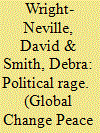| Srl | Item |
| 1 |
ID:
148440


|
|
|
|
|
| Summary/Abstract |
In September 1919, the Italian poet Gabriele D’Annunzio gathered a force of 2,000 mutinous troops from the Royal Italian Army, along with hundreds of other volunteers, and stormed the city of Fiume, on the Adriatic coast, which had been contested territory since the end of World War I. D’Annunzio had served as a fighter pilot in the war, and his daring feats had turned him into one of the most famous people in Europe. An ultranationalist, he had long wanted “Mother Italy” to seize all the territories that he believed rightly belonged to her. In 1911, he had zealously supported Italy’s invasion of Libya, an imperialist adventure whose savagery stoked outrage across the Muslim world. In Fiume, he saw a chance to realize his dream of rejuvenating Italy through war.
|
|
|
|
|
|
|
|
|
|
|
|
|
|
|
|
| 2 |
ID:
086623


|
|
|
|
|
| Publication |
2009.
|
| Summary/Abstract |
Recently there has been a renewed interest in the role of emotion as both a site of political knowledge and as a contributing dynamic in the stability or upheaval of political institutions. While it is widely recognised that emotion is directly implicated in terrorist behaviour, terrorism studies has not critically engaged in this revitalised theorising. As a small step towards addressing this analytical gap we argue that there is a need to see terrorism as a political act grounded in a particular set of human emotions triggered in certain social circumstances. We begin with a brief discussion of the treatment of emotion within terrorism studies before examining how modernity might contribute to an intensification of emotion within political behaviour. We posit that one outcome of this intensification is the adoption of violent forms of political agency by individuals seeking to address real or perceived grievances.
|
|
|
|
|
|
|
|
|
|
|
|
|
|
|
|